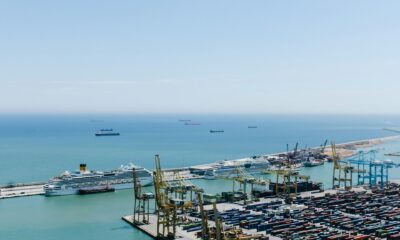Business
Six out of ten Spanish companies will invest in digitization to overcome the crisis
The study highlights the high percentage of companies with fast fixed broadband connection (82%) and ultrafast (62%), well above the European average (76% and 46%, respectively). Spain is also the eighth economy in the EU with the highest percentage of companies with online sales of their products and services, 27%, which is 6 points above the EU average.

Spanish companies are betting on digitalization and investment in new technologies as the fastest and most effective way out of the severe economic crisis caused by the pandemic.
According to the first Barometer for the Economic Reactivation of Companies and Workers, a clear example is the digital acceleration of Spain, which has positioned the country above the European average in online performance. Moreover, 59.9% of the companies surveyed said that, despite the seriousness of the situation, this year they will invest in digital transformation. The Barometer was carried out by the Valencian Institute of Economic Research (Ivie) and #EActíVate, the platform that inherited the campaign ‘Esto no tiene que parar’, promoted by Mercadona.
The study, in which 840 companies, businessmen, entrepreneurs, self-employed and workers adhered to the initiative have participated, highlights that in 2020 a total of 14 of the 88 sectors of the Spanish economy created jobs and that 38.5% of the surveyed firms expect to exceed this year the turnover of the past. 29.5% also state that they will increase the workforce of their companies in 2021 compared to 2020 and 33.8% consider that during the current year, at least, they will have recovered the pre-crisis level of investment.
Read more about the commitment to the digitalization of Spanish companies and find other important business headlines with our companion app, Born2Invest.
Rebuilding after the pandemic
For the time being, the sectors that are growing and continuing to generate jobs are those related to new technologies, e-commerce, agriculture, food processing, retail, and the medical and health sector. All this after the strong impact caused by the pandemic, as reflected in the loss of 7.5% of employed people in the last year.
As Paula Llop, head of the #EActíVate initiative, explained, “we wanted to carry out this Barometer to offer a vision of the economic situation of our country from the perspective of the effort and the capacity for reinvention and adaptation that businessmen, entrepreneurs, self-employed and workers have made in 2020 and continue to make.”
Although for Llop “much remains to be done for the recovery, we have been very impressed by the data analyzed by the Ivie, the great advances in digitization, innovation and sustainability, despite the complicated times we are living in.”
Joaquín Maudos, Ivie’s Deputy Director, explained with respect to the 2020 results that “it is important to highlight that even in an adverse environment there are companies that have shown resilience, adapting to the new conditions and that have taken advantage of the circumstances to promote a digital transformation.”
However, and despite the momentum of digitization, those responsible for the study also warned that only 20% of companies train their employees in information and communication technologies. “The year 2020 has been key in the digital transformation of the business fabric. And the fact is that digitization is not an option, today it is a necessity,” they say.
The study highlights the high percentage of companies with fast fixed broadband connection (82%) and ultrafast (62%), well above the European average (76% and 46%, respectively). Spain is also the eighth economy in the EU with the highest percentage of companies with online sales of their products and services, 27%, which is 6 points above the EU average.
__
(Featured image by Free-Photos via Pixabay)
DISCLAIMER: This article was written by a third party contributor and does not reflect the opinion of Born2Invest, its management, staff or its associates. Please review our disclaimer for more information.
This article may include forward-looking statements. These forward-looking statements generally are identified by the words “believe,” “project,” “estimate,” “become,” “plan,” “will,” and similar expressions. These forward-looking statements involve known and unknown risks as well as uncertainties, including those discussed in the following cautionary statements and elsewhere in this article and on this site. Although the Company may believe that its expectations are based on reasonable assumptions, the actual results that the Company may achieve may differ materially from any forward-looking statements, which reflect the opinions of the management of the Company only as of the date hereof. Additionally, please make sure to read these important disclosures.
First published in elEconomista.es, a third-party contributor translated and adapted the article from the original. In case of discrepancy, the original will prevail.
Although we made reasonable efforts to provide accurate translations, some parts may be incorrect. Born2Invest assumes no responsibility for errors, omissions or ambiguities in the translations provided on this website. Any person or entity relying on translated content does so at their own risk. Born2Invest is not responsible for losses caused by such reliance on the accuracy or reliability of translated information. If you wish to report an error or inaccuracy in the translation, we encourage you to contact us.

-

 Africa6 days ago
Africa6 days agoMorocco’s Wheat Dependency Persists Despite Improved Harvest
-

 Crypto2 weeks ago
Crypto2 weeks agoBrazil’s Crypto Boom Threatened by Surprise Tax Proposal
-

 Biotech14 hours ago
Biotech14 hours agoEcnoglutide Shows Promise as Next-Generation Obesity Treatment
-

 Markets1 week ago
Markets1 week agoCocoa Prices Drop Amid Speculative Selling and West African Supply Concerns
























